
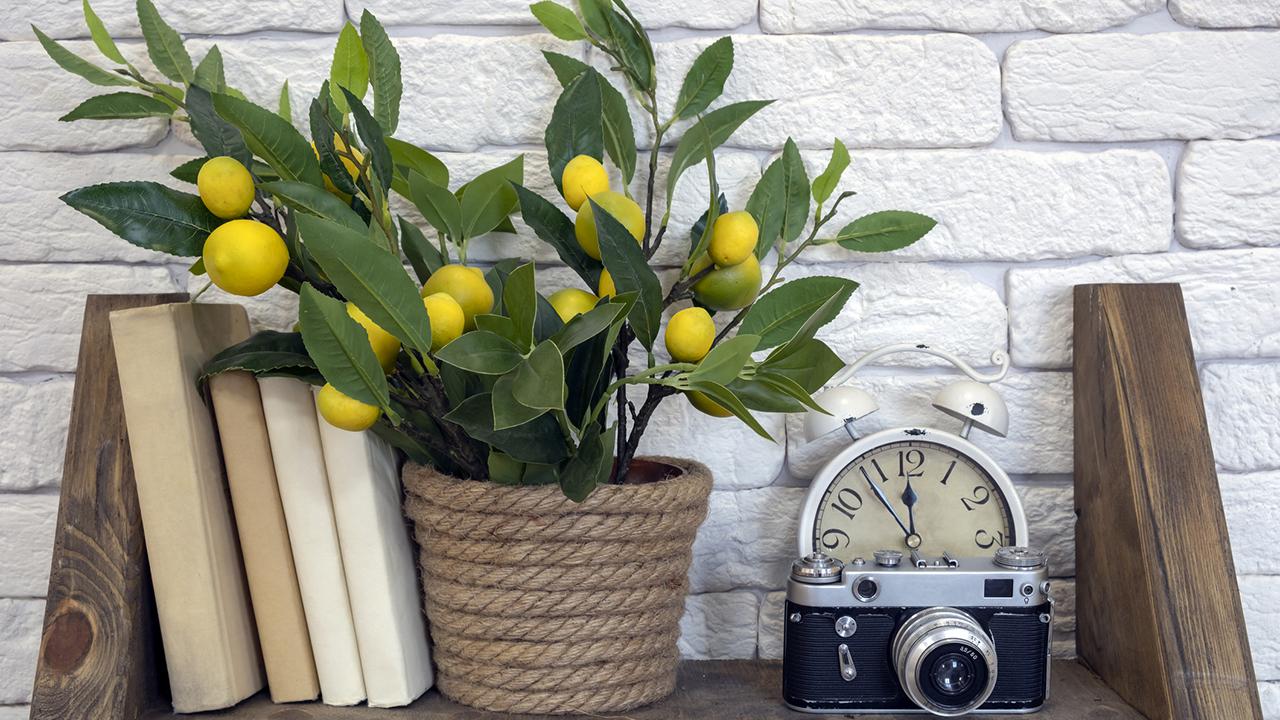
Adil Abdrakhmanov / iStock / Getty Images
Have you ever wanted to have your own fruit tree, growing right there in your front yard? If so, one option to consider is the Meyer lemon tree. This unique citrus tree has become a favorite among home gardeners, as well as those who simply want tantalizing citrus fruits available anytime.
But what is the Meyer lemon tree, exactly? What makes it so popular? And what should home gardeners know about caring for one? In this guide, we’ll cover all those subjects and more.
What is a Meyer Lemon Tree?
Meyer lemon trees are small citrus trees with glossy leaves and white flowers that produce a yellow-orange fruit. They can grow up to 10-feet tall and live for 50 years.
If you actually want to taste a Meyer lemon before investing in a full tree, really all you need to do is head to your local farmer’s market. Actually, that’s one of the only ways to try a Meyer lemon, because these fruits currently aren’t grown commercially so you can’t find them in most grocery stores. The sole ways to sample their citrusy goodness are to plant your own tree or support a local grower.
As for the fruits themselves, they’re actually hybrids. The Meyer lemon is part regular lemon, part mandarin orange. They have a number of popular uses, both in the culinary scene and also for home decor. For instance, chefs love using the sweet-tart skins to garnish or flavor different dishes. The thin, delicate, thin skin of the Meyer lemon can also be useful for different festive and seasonal garlands.
History of the Lemon Tree
So where do these unique, hybrid citrus trees come from, exactly? Nobody knows precisely when they originated, but we know they were introduced to the United States around 1908, brought over by Chinese immigrants. Unfortunately, the Meyer lemon tree was quite susceptible to disease, and almost died out in American soil.
Then, around 1975, scientists at the University of California developed something they called the Improved Meyer lemon tree, which is basically the same fruit-bearing plant, but much more impervious to insects and disease-resistant. This is the Meyer lemon tree we know today.
The Benefits of a Lemon Tree
There are a number of reasons why gardeners love planting this particular citrus tree. A few of the main benefits include:
- The Meyer lemon tree is self-pollinating.
- These citrus trees can produce fruit in as little as two years’ time.
- You can actually grow them indoors or outdoors, and they will yield fruit either way.
- During winter, they tend to yield a heavy harvest.
Now, there may be some potential downsides, including the fact that the Meyer lemon tree requires regular misting; we’ll return to that later, when we discuss tips to care for these citrus trees.
What Do These Citrus Trees Look Like?
Meyer lemon trees can grow to be anywhere from six feet to 10 feet; the dwarf variety should be closer to five to seven feet. If you grow your Meyer lemon tree in an indoor pot, that will ensure that it remains on the smaller side.
The tree will produce glossy leaves, dark green in their hue. You’ll also see some white fragrant flowers, delicate and with a hint of purple at the base, that bloom twice a year. The lemons themselves, when ripe, are yellow-orange in color. The skins give off a pleasant, citrusy aroma, which is one reason why these trees are so popular.
The Best Places to Buy a Meyer Lemon Tree
If you’re interested in getting one of these trees for your own home or garden, one of the first decisions you’ll have to make is where you’re going to buy it. The good news is that there are a number of online retailers where you can get your own Meyer lemon tree.
Each product featured here has been independently selected by the writer. If you make a purchase using the links included, we may earn commission.
Gardens Alive!
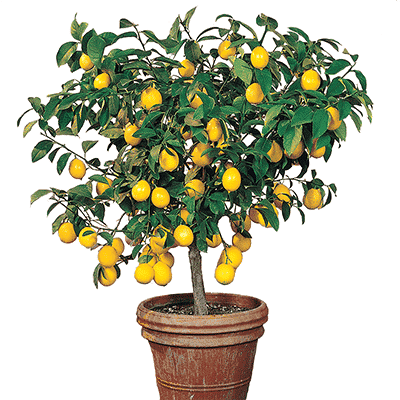
gardensalive.com
Looking to get a Meyer lemon tree that’s on the smaller side? The “dwarf” variety can make a great option, especially for potted/indoor use. Gardens Alive! offers one for a really low price, and they also provide plenty of great information about caring for your new plant.
Why buy: This online lawn and garden retailer is a trusted source for high-quality flora, and their pricing is very affordable.
FastGrowingTrees.com
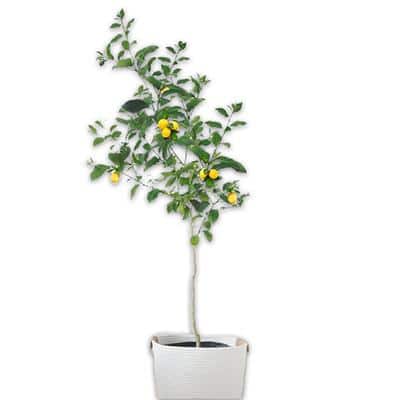
fast-growing-trees.com
At FastGrowingTrees.com, you can get a full-sized Meyer lemon tree that will yield fruit within its first year. And, you’ll get fast shipping, too, allowing you to get your tree situated for fruiting as quickly as possible.
Why buy: For a well-tended, well-rooted plant that’s on the cusp of bearing fruit, FastGrowingTrees.com is the place to shop.
Citrus.com
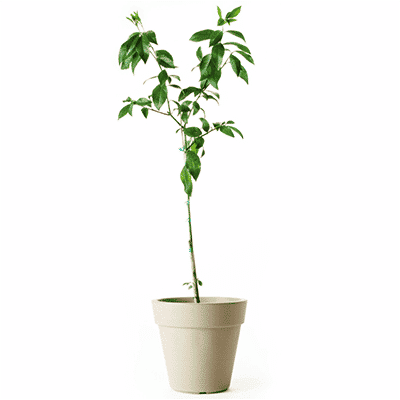
citrus.com
At Citrus.com, you can get the Improved Meyer lemon tree for a reasonably low price, and with expedient shipping. There are also some helpful accessories you can add to your order to help care for your tree.
Why buy: Want to get your Meyer lemon tree from the citrus experts? Why not browse the selection at Citrus.com?
Nature Hills Nursery
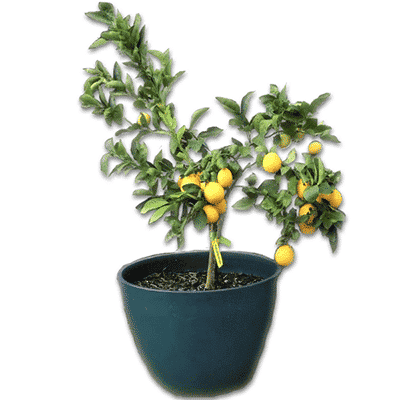
naturehills.com
Nature Hills nursery is one of the most trusted online plant retailers, and not without reason: They have a wide range of flora and are known for their affordable pricing, flexible shipping options, and devotion to quality.
Why buy: Experienced gardeners trust Nature Hills enough to make it the #1 online nursery in the country. Definitely worth considering for your Meyer lemon tree.
Amazon
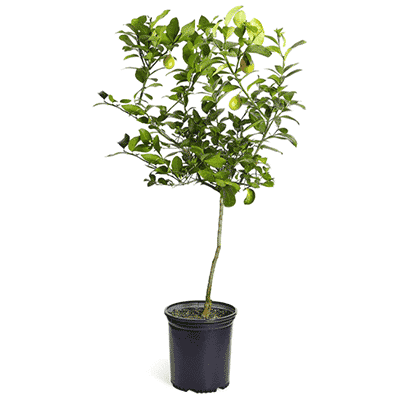
amazon.com
Of course, if it’s convenience you crave, it’s pretty hard to top Amazon’s selection of Meyer lemon trees. Take note that Amazon is actually a pretty decent place to browse for plants, as they partner with a lot of great nurseries from across the country. Not only can you consider a number of different Meyer lemon tree options, but Amazon is also a great place to stock up on basic lawn and garden tools.
Why buy: For selection and convenience, Amazon is hard to beat. We like the options from Brighter Blooms or Citrus.com.
Home Depot
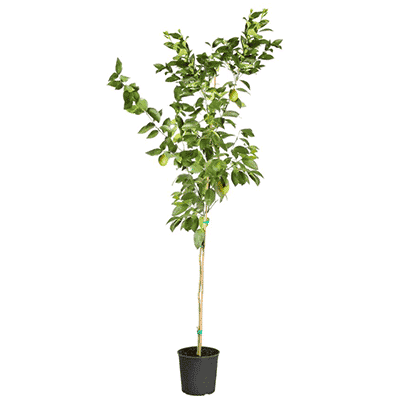
homedepot.com
More and more big box home improvement stores have started carrying extensive indoor and outdoor plant selections. You can get a Meyer lemon tree at your local Home Depot, or simply by heading over to Home Depot’s website.
Why buy: Home Depot supplies high-quality plants as well as a generous selection of lawn and garden tools. You can also potentially pick up your tree in store the same day.
How Do You Plant a Meyer Lemon Tree?
Purchasing your new citrus tree is obviously the first step, but once it arrives, you’ll need to know how to plant it.
Consider the Ideal Hardiness Zones
If you’re going to keep your Meyer lemon tree in a pot, enjoying it purely as an indoor plant, then you can disregard this section. But if you wish to transplant it to your lawn or garden, then you need to know a thing or two about hardiness zones.
What are hardiness zones? Basically, these are classifications that farmers and other planters use to determine which regions of the country are best suited for cultivating specific types of plants.
Meyer lemon trees tend to thrive in USDA Hardiness Zones 8-11, which encompass the southern coastal regions as well as the deep southern half of the country. If you live further north, then you may want to reconsider just growing your Meyer lemon tree indoors.
Tips for Planting a Meyer Lemon Tree
Now, if you plan on cultivating your new citrus tree in a pot, there are a few specific tips and considerations you’ll want to keep in mind. Some tips for planting a Meyer lemon tree include:
- Plant your tree in a sturdy container that’s at least one or two sizes larger than the container it came in. Also double check that your container has drainage holes at the bottom.
- Put an inch or two of stone at the bottom of the container, to serve as an anchor for your lemon tree.
- The ideal potting mixture includes peat moss, potting soil, and perlite.
- Carefully slide your Meyer lemon tree out of the container, and take a moment to cut off any dry roots and “fluff” roots that have become matted.
- Next, position the tree in the center of its new container.
- Add your potting mixture, ensuring that the crown of the roots rests just above the line of the soil.
- Slowly add some water to the pot, and place it somewhere near a south-facing window.
By following these steps, you’ll be off to a great start tending to your Meyer lemon tree!
How to Care for Your Meyer Lemon Tree
Once the tree is planted, it is wise to follow a few additional steps to nurture it to guarantee healthy growth. Proper care not only extends the life of your Meyer lemon tree, but also ensures you get plenty of that sweet-tart fruit!
Sunlight Requirements
The first thing you’ll need to know about is the sunlight requirements for your Meyer lemon tree. Like most citrus plants, this one thrives when it gets ample exposure to direct sunlight. This means a good eight to 12 hours of full sun, whenever possible.
Hopefully, you can achieve this simply by positioning your plant somewhere beside a window facing south or southwest. If not, then you may want to consider indoor growing lights, which can offer the same photosynthetic effects as direct sunlight.
Watering Requirements
Another critical consideration is watering. Here, some delicacy is required, as citrus plants tend to thrive in water that’s moist but not flat-out wet. Many Meyer lemon tree experts recommend watering deeply and infrequently. Any time you find that the top two inches of soil are dry, that means it’s time to add water.
Also be aware that, like most citrus trees, this one fares best in humidity. Mist it daily. Also consider adding a bit of water to the tray under your pot; this water will rise up and add some additional humidity.
Soil Requirements
Meyer lemon trees prefer loamy soil with a pH around 6.0 to 6.5. You’ll need to fertilize it around once a month with a nutrient-rich, slow-release nitrogen fertilizer. This tree also requires spacing of 36-60 inches in order to best provide a year-round growing season.
What About Temperature?
It’s also vital to know the optimal temperature for your Meyer lemon tree. So long as you keep it somewhere between 50 degrees and 80 degrees Fahrenheit, you should be just fine. Note: If you’re keeping your Meyer lemon tree outside and the temperature drops below 50 in the winter months, you’ll want to bring it inside until things warm up.
How Much Does a Meyer Lemon Tree Cost?
As you prepare to invest in a new citrus tree, it may be helpful to have a basic price range in mind.
The price point for a Meyer lemon tree can vary greatly, ranging from just under $20 for cuttings to over $100. Usually, the price is determined by the tree’s size and maturity. In other words, you can expect to pay less for a small plant or cutting, which you will then need to nurture. And you will likely pay a little more for trees that are already grown and closer to bearing fruit.
Do Meyer Lemon Trees Actually Grow Fruit?
With proper care, your tree should bear fruit. This may happen in as little as two years or as many as seven years, depending on the age of the plant when you receive it. You can expect that your tree will bear the most fruit primarily in the winter season. Again, the number of lemons you get will depend on the health of the tree, but often these yields are quite generous. Note that these trees can live for 50 years, so you may have many seasons of delicious citrus fruit!
Getting Started with a Meyer Lemon Tree
If you’re looking for a truly unique addition to your home garden, whether that’s indoors or outdoors, look no further than to the Meyer lemon tree. Cultivating these plants can be immensely rewarding, but it will require some work. Start by doing your due diligence, learning more about different places to buy trees, how to plant them, and how to care for them over time.
Josh Hurst is a journalist, critic, and essayist. He lives in Knoxville, TN, with his wife and three sons. He covers natural health, nutrition, supplements, and clean energy. His writing has appeared in Health, Shape, and Remedy Review.

 233k
233k  41k
41k  Subscribe
Subscribe 